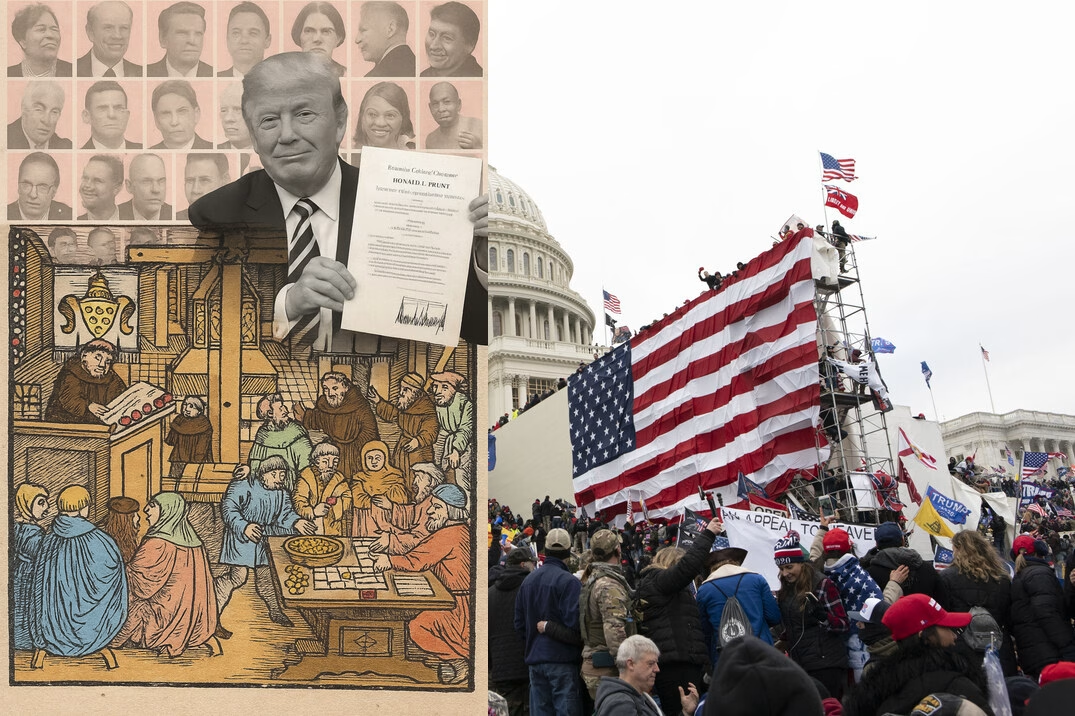By Mary Jones | Monday, July 14, 2025 | 4 min read
A new political analysis book, Mein Kampf & Trump: A Dangerous Resemblance, draws a striking historical parallel between former President Donald Trump’s use of presidential pardons and the medieval Catholic Church’s practice of selling indulgences. The comparison sheds light on how political power, both in the past and present, can be used to manipulate justice and reward loyalty.
During the Middle Ages, the Catholic Church engaged in the sale of indulgences—documents that promised absolution from sins in exchange for money. This system allowed the wealthy and well-connected to bypass moral accountability, while ordinary people were left to bear the full burden of punishment and spiritual guilt. The sale of indulgences eventually sparked widespread outrage and played a key role in the Protestant Reformation, as it was seen as a corruption of religious and ethical principles.
Mein Kampf & Trump: A Dangerous Resemblance explores how authoritarian strategies resurface in modern democratic contexts—particularly through the misuse of presidential pardons. During his previous term, Donald Trump granted clemency to several close allies, including Paul Manafort, Roger Stone, and Charles Kushner, all of whom were embroiled in serious legal and ethical controversies. Now, in his second term as president, Trump has issued blanket pardons for individuals convicted in the January 6 Capitol attack.
This sweeping use of executive power signals a disturbing pattern: the extension of legal forgiveness not based on justice or rehabilitation, but as a political tool to reward loyalty, reframe insurrectionists as patriots, and reinforce a narrative of grievance and victimhood. The move echoes historical abuses—like the medieval sale of indulgences—where forgiveness was transactional, not principled, eroding public trust in institutions meant to uphold equality under the law.
Trump famously labeled some undocumented immigrants as “rapists” and “criminals” early in his presidential campaign. His administration aggressively pursued immigration policies that aimed to deport individuals with any criminal record—including minor nonviolent offenses.
However, the pardons granted during his term often benefited wealthy, white-collar criminals, many of whom had personal or political ties to Trump. This contradiction between rhetoric and action has been widely criticized by legal scholars, immigrant rights groups, and watchdog organizations. They argue that the pardons reflected a political and personal loyalty test, rather than a consistent application of justice.
While the U.S. Constitution grants the president broad powers to issue pardons, this authority is rooted in the idea of justice and mercy. Traditionally, pardons are intended to correct miscarriages of justice or show compassion in extraordinary circumstances. However, the book argues that Trump’s use of pardons often served a different purpose—protecting loyalists, rewarding silence, and shielding allies from legal consequences.
This strategy, the book contends, mirrors the political function of indulgences. Both systems create a dual standard of justice—one for the connected and one for the rest. In both cases, forgiveness becomes transactional. It is no longer about justice or redemption but about maintaining power and rewarding allegiance.
The comparison is not merely rhetorical. Mein Kampf & Trump: A Dangerous Resemblance connects this pardon strategy to broader historical patterns of authoritarian behavior. In Adolf Hitler’s Germany, loyalty to the regime was similarly rewarded with immunity and favor, often at the expense of legal norms and democratic institutions. The book argues that while the contexts are vastly different, the underlying tactics—centralizing power, undermining institutions, and rewarding personal loyalty over principle—follow a recognizable authoritarian playbook.
Importantly, the book does not equate Trump’s actions with the atrocities of the Nazi regime. Rather, it focuses on early warning signs—patterns in leadership style, economic policy, and political behavior—that historically precede democratic decline. The use of pardons to protect political allies is presented as one such warning sign.
In drawing these historical parallels, Mein Kampf & Trump aims to provoke critical thought about the use and abuse of power in democratic societies. It calls attention to the subtle ways leaders can manipulate legal and moral authority, and how such actions, when unchecked, can corrode public trust in institutions meant to serve all citizens equally.
Now available on Amazon, the book contributes to an ongoing national conversation about justice, leadership, and the lessons history continues to offer in the face of rising political polarization.
See What the Algorithms Think — Live Search Engine Ranking Insights
Yahoo and Google are now ranking Mein Kampf & Trump: A Dangerous Resemblance among trending political books and articles. What’s fueling the attention? Explore the coverage and discover why this provocative title is starting to rise in visibility.
Billionaire Media Owners Bend to Trump’s Pressure — and Shower Him With Millions
The Epstein Files Are a Crime Scene—and the Powerful Are Still Walking Free
Trump Expresses Anger at DOJ Over Epstein Files Referencing His Name Over 38,000 Times
Photo Shows ‘Melania’ Director Brett Ratner with Jeffrey Epstein and Women
Cash, Free Tickets, and $50: Craigslist Ad Seeks to Fill ‘Melania’ Screenings

Copyright 2024 FN, NewsRoom.






